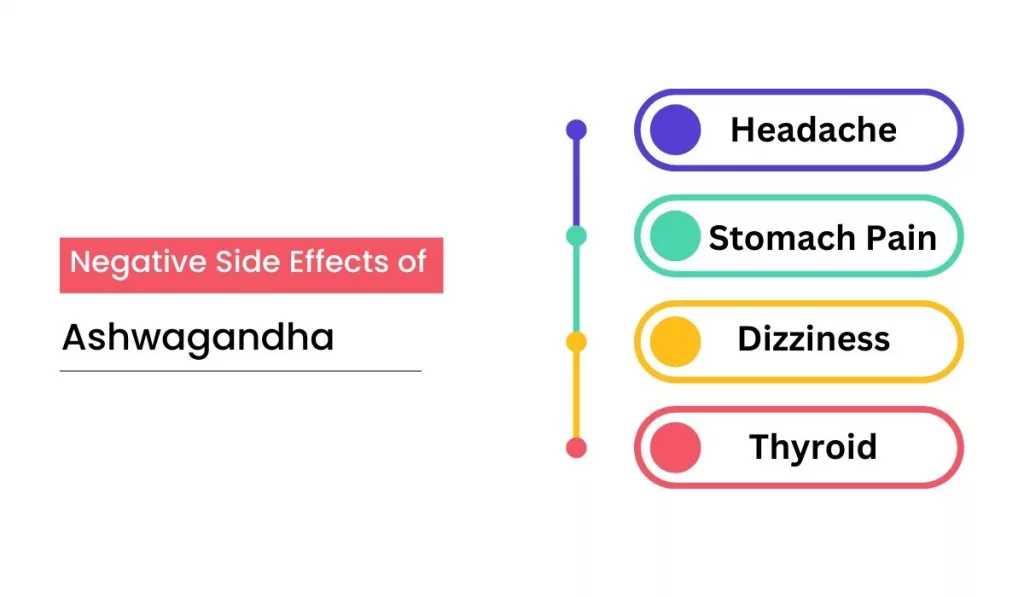
10 Negative Side Effects of Ashwagandha
Ashwagandha is an ancient Ayurvedic herb that has been used for centuries to support overall health and well-being. It has a wide range of therapeutic benefits, including reducing stress, boosting immunity, and balancing hormones. However, like any other herbal supplement or medication, ashwagandha can have side effects. While the majority of people don’t experience any negative reactions from taking ashwagandha, some people may be more sensitive to its components. Here, we will explore 10 potential negative side effects associated with ashwagandha so that you can make an informed decision about whether it is right for you.
Overview: Ashwagandha
Ashwagandha is an herbal supplement that has been used for centuries in traditional Indian medicine. It is most commonly used to help with stress and anxiety, but it can also be used to boost energy levels, improve sleep, and promote overall health.
While ashwagandha is generally safe and well-tolerated, there are a few potential side effects to be aware of. The most common side effects include stomach upset, diarrhea, and constipation. In rare cases, more serious side effects have been reported, such as liver damage and inflammation. If you experience any adverse effects while taking ashwagandha, stop taking the supplement and speak with your healthcare provider.
Also Read: Top 15 Health Benefits of Chia Seeds
10 Negative Side Effects of Ashwagandha
Ingesting Ashwagandha may lead to several negative side effects, including gastrointestinal issues, allergic reactions, and interactions with certain medications.
1. Headache: Negative Side Effects of Ashwagandha
If you experience a headache after taking ashwagandha, it is likely due to the herb’s stimulant properties. caffeine. Try drinking plenty of fluids and resting in a dark room until the headache subsides. If the headaches persist, discontinue the use of ashwagandha and speak with your healthcare provider.
Also Read: Do Hydration Multipliers Actually Work? We Investigate
2. Diarrhea
The most common side effect of ashwagandha is diarrhea. This can be caused by the herb’s interaction with other medications, or it may be a standalone side effect.
Diarrhea can be uncomfortable and may lead to dehydration if not treated properly. If you experience diarrhea while taking ashwagandha, be sure to drink plenty of fluids and consult your healthcare provider if diarrhea persists.
Also Read: Dash Diet Recipes Ideas
3. Nausea and Vomiting
Although nausea and vomiting are not common side effects of ashwagandha, they can occur in some people. If you experience these symptoms, it is important to drink plenty of fluids and eat small, frequent meals to prevent dehydration. You may also want to try taking the herb with food or milk to reduce nausea. If the symptoms are severe or persistent, stop taking ashwagandha and see your healthcare provider.
Also Read: The Best Night Time Skin Care Routine for Healthy Skin
4. Stomach Pain
If you experience stomach pain after taking ashwagandha, it is important to consult with your healthcare provider to rule out any other potential causes. Ashwagandha is generally considered safe when taken in appropriate doses, but some people may experience side effects like stomach pain, diarrhea, or nausea. If you experience any of these side effects, discontinue use and consult your healthcare provider.
5. Rash
One of the less common but bothersome side effects of ashwagandha is a skin rash. This can take the form of either hives or welts and can be itchy and uncomfortable. If you develop a rash after taking ashwagandha, discontinue use and consult your doctor.
Also Read: Amazing Health Benefits of Guava
6. Dizziness
If you experience any dizziness after taking ashwagandha, it is important to drink plenty of fluids and lie down until the feeling passes. If you feel dizzy while standing up, sit or lie down immediately and avoid sudden movements. Drink lots of fluids, especially water, and avoid hot beverages. Ashwagandha can also cause excess gas and bloating in some people. If this happens, try taking the herb with food.
7. Difficulty Sleeping
If you’re taking ashwagandha and having difficulty sleeping, you’re not alone. This is a common side effect of the herb, and it can be frustrating. There are a few things you can do to help ease insomnia, though.
First, try taking your ashwagandha at a different time of day. If you usually take it in the morning, try taking it at night. If you take it at night, try taking it in the morning. This can help to regulate your body’s natural rhythms and make it easier to sleep.
Second, make sure that you’re getting enough rest during the day. Getting up and moving around will help to keep your energy levels up, but too much activity can make it harder to sleep at night. Make sure that you’re getting at least 7-8 hours of sleep every night.
If all else fails, talk to your doctor about other options for treating your insomnia. There are many medications that can help with this condition, and your doctor will be able to determine which one is right for you.
Also Read: Top 15+ Health Benefits of Guava Leaves
8. Ringing in the Ears
If you experience ringing in your ears after taking ashwagandha, it is important to stop taking the supplement and consult with a healthcare professional. While this side effect is not common, it can be very annoying and may indicate a more serious problem. If you continue to experience ringing in your ears after stopping ashwagandha, it is important to see a doctor to rule out any other potential causes.
Also Read: The Best Fat Burning Cabbage Soup
9. Thyroid Problems
It can interfere with the functioning of the thyroid gland. If you have any sort of thyroid problem, you should avoid taking ashwagandha. It can also cause drowsiness and sleepiness. If you are driving or operating heavy machinery, do not take ashwagandha. Finally, it can also increase the risk of bleeding, so if you are taking any sort of blood-thinning medication, you should avoid taking ashwagandha.
10. Liver Damage
Liver damage is a rare but serious side effect of ashwagandha. If you take ashwagandha and notice any symptoms of liver damage, such as yellowing of the skin or eyes, dark urine, abdominal pain, or fatigue, stop taking the supplement and see your doctor right away. Liver damage from ashwagandha is usually reversible with treatment, but it can be fatal in rare cases.
- It’s important to note that Ashwagandha is generally considered safe, and when consumed in appropriate doses, it has minimal side effects. But, it’s always best to consult a healthcare professional to understand if it is suitable for you, and to know the right dosage that works for you.
Also Read: Is Banana Good for Weight Loss?
Ingesting Ashwagandha may lead to several negative side effects, including gastrointestinal issues, allergic reactions, and interactions with certain medications. Let’s see more!
Other Negative Side Effects of Ashwagandha
| Negative Side Effect | Description |
|---|---|
| Upset stomach | Ashwagandha can cause digestive discomfort, including nausea, diarrhea, and stomach pain. |
| Drowsiness | Ashwagandha has sedative properties, which can lead to drowsiness and fatigue. |
| Headaches | Some people may experience headaches when taking ashwagandha supplements. |
| Low blood pressure | Ashwagandha can lower blood pressure, which can be dangerous for individuals with already low blood pressure or those taking medication to lower blood pressure. |
| Allergic reactions | In rare cases, ashwagandha can cause an allergic reaction, including hives, itching, and difficulty breathing. |
| Interactions with medications | Ashwagandha may interact with certain medications, including thyroid hormone replacement therapy, immunosuppressants, and sedatives. |
Conclusion
Overall, ashwagandha is a great supplement with many benefits. However, like all supplements, it has some potential side effects to consider. We have listed 10 of the most common negative side effects that you should be aware of before taking this supplement. For the best results always speak to your doctor before adding any type of dietary supplement into your routine and make sure to follow dosage instructions exactly as they appear on the bottle or package insert.
FAQs on Side Effects of Ashwagandha
The most common side effect of ashwagandha is gastrointestinal upset, which may include nausea, vomiting, and diarrhea. Other reported side effects include headache, dizziness, insomnia, and anxiety. Rarely, more serious side effects have been reported, including liver damage and seizures.
It is not clear why some people are more susceptible to side effects from ashwagandha than others. Factors that may play a role include individual differences in metabolism and gut flora, as well as the quality of the ashwagandha supplement itself.
There are a few things you can do to reduce your risk of experiencing side effects from ashwagandha. First, be sure to buy a high-quality supplement from a reputable source. Second, start with a lower dose and slowly increase it over time as your body adjusts. Finally, take Ashwagandha with food to help reduce gastrointestinal upset.























[…] Also Read: Negative Side Effects of Ashwagandha […]
[…] 10 Negative Side Effects of Ashwagandha […]
[…] Also Read: 10 Negative Side Effects of Ashwagandha […]
[…] Also Read: 10 Negative Side Effects of Ashwagandha […]
[…] Also Read: Negative Side Effects of Ashwagandha […]
[…] Checkout our list of: 10 Negative Side Effects of Ashwagandha […]